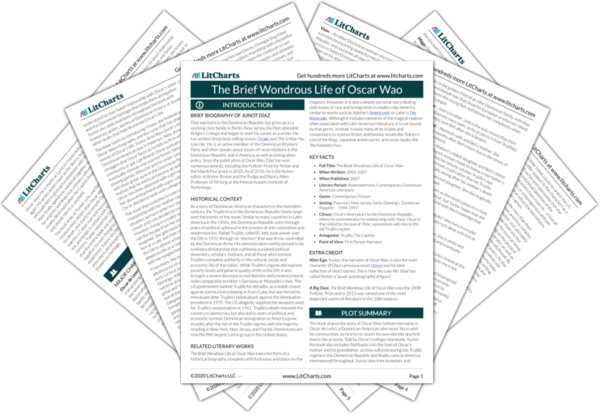While the novel follows many threads in Oscar’s life, it is primarily concerned with love in all its varied forms. Like many coming-of-age novels, Oscar’s search for maturity takes the form of a search for romantic love, but the themes of love also go further than that in the novel.
Oscar’s definition of love and his methods of finding it are shaped by the cultural expectations surrounding love and sex in the Dominican environment of the novel. According to Yunior, Dominicans detrimentally confuse sexual love and true intimacy. Due to this, some characters look for love their entire lives without finding it. Yunior expects love to be easy and to fix his insecurities, ignoring the real work and care that a healthy, intimate relationship requires on behalf of both himself and his partner. Even worse, many Dominican men use romantic love as a way to exercise power or show status, as in Trujillo’s “culocracy,” the tendency towards domestic abuse, and Yunior’s casual use of women. As a response to these harmful sexual norms, Oscar’s relationship with a prostitute – the lowest of the low on the Dominican social spectrum – is shown to be the truest expression of love in the novel.
Yet while these romantic relationships drive the plot, other types of love, such as friendship or family, form the foundation of the novel. Both Oscar and Lola offer Yunior a crucial alternative to romantic love, and the friendship between Oscar and Yunior proves to be the most important bond of the novel. Likewise, Oscar and Beli call upon the strength of their love for their family when the loss of romantic love leaves them near death. The more passionate displays of romantic love may receive more attention, but the quiet power of family and friendship helps the characters face hardship and tragedy.
The novel shows that loving someone also means inviting the possibility of losing them, but it also declares that the beauty of love is well worth the pain of loss. These two universal human experiences unite mankind despite any cultural differences, and offer hope to the characters despite the many harsh scenes of the novel. In a fitting end to the novel, Oscar’s last letters to the States proclaim “The beauty! The beauty!” of love rather than focusing on all the pain and loss Oscar has seen throughout his life.
Love and Loss ThemeTracker

Love and Loss Quotes in The Brief Wondrous Life of Oscar Wao
For those of you who missed your mandatory two seconds of Dominican history: Trujillo, one of the twentieth century’s most infamous dictators, ruled the Dominican Republic between 1930 and 1961 with an implacable ruthless brutality… At first glance, he was just your prototypical Latin American caudillo, but his power was terminal in ways that few historians or writers have ever truly captured or, I would argue, imagined. He was our Sauron, our Arawn, our Darkseid, our Once and Future Dictator, a personaje so outlandish, so perverse, so dreadful that not even a sci-fi writer could have made his ass up.

Unlock explanations and citation info for this and every other The Brief Wondrous Life of Oscar Wao quote.
Plus so much more...
Get LitCharts A+Pujols, it seems, had promised Belicia that they would be married as soon as they'd both finished high school, and Beli had believed him, hook, line, and sinker. Hard to square her credulity with the hardnosed no-nonsense femme-matador I'd come to know, but one must remember: she was young and in love. Talk about fantasist: the girl sincerely believed that Jack would be true.
…you could argue that the Gangster adored our girl and that adoration was one of the greatest gifts anybody had ever given her. It felt unbelievably good to Beli, shook her to her core. (For the first time I actually felt like I owned my skin, like it was me and I was it.)
Don’t laugh, mi negrita, for your world is about to be changed. Utterly. Yes: a terrible beauty is etc., etc. Take it from me. You laugh because you've been ransacked to the limit of your soul, because your lover betrayed you almost unto death, because your first son was neverborn. You laugh because you have no front teeth and you've sworn never to smile again.
These days I have to ask myself; What made me angrier? That Oscar, the fat loser, quit, or that Oscar, the fat loser, defied me? And I wonder: What hurt him more? That I was never really his friend, or that I pretended to be?
A heart like mine, which never got any kind of affection growing up, is terrible above all things.
Oscar remembers having a dream where a mongoose was chatting with him. Except the mongoose was the Mongoose. What will it be, muchacho? it demanded. More or less? And for a moment he almost said less. So tired, and so much pain – Less! Less! Less! – but then in the back of his head he remembered his family... More, he croaked. --- --- --- said the Mongoose, and then the wind swept him back into darkness.
On one of our last nights as novios (boyfriend and girlfriend) she said, Ten million Trujillos is all we are.
Behold the girl: the beautiful muchachita: Lola's daughter. Dark and blindingly fast: in her great-grandmother La Inca’s words: una jurona. Could have been my daughter if I'd been smart, if I'd been ---. Makes her no less precious. She climbs trees, she rubs her butt against doorjambs, she practices malapalabras when she thinks nobody is listening. Speaks Spanish and English. Neither Captain Marvel nor Billy Batson, but the lightning.
So this is what everybody's always talking about! Diablo! If only I'd known. The beauty! The beauty!











